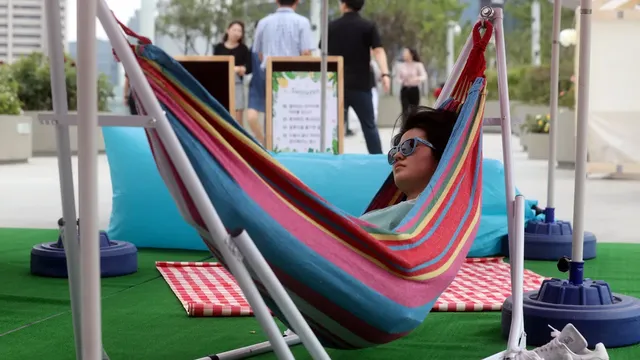They nap in garages, on side streets before leaving for school in the afternoon, in nap houses rented by the hour, or stretch out in bed while working from home.
But do people who nap during the day or at work have any health benefits?
Several scientific studies have found that napping brings benefits, such as improved memory and focus, reports Euronews.
According to a recent study published in the journal Sleep, an afternoon siesta is the norm in parts of Spain and Italy, while in China and Japan napping is encouraged as working to exhaustion is considered a sign of dedication.
Here are some tips on daytime napping and its potential benefits.
Sleep is just as important to good health as diet and exercise, but too many people don't give it enough time, according to James Rowley, program director of the Department of Sleep Medicine at Rush University Medical Center.
"A lot of it has to do with electronics. It used to be TVs, but now the biggest culprit is cell phones. People just take them to bed with them and watch," Rowley said.
For example, a 2021 study found that young people who use their phones before sleep are more likely to report sleep problems.
The key to an effective nap is to keep it short, the expert said, adding that short naps can be restorative and are more likely to make you more alert.
"Most people don't realize that naps should be within 15 to 20 minutes. Anything longer than that can lead to problems with sleep momentum, difficulty waking up and tiredness," he added.
Individuals who constantly rely on naps to make up for insufficient sleep should probably examine their bedtime habits as well.
Mid-afternoon is the ideal time for a nap as it coincides with the natural circadian decline, while napping after 6pm can interfere with the night-time sleep of those who work during daylight hours, said Michael Chi, director of the Centre for Sleep and Cognition at the National University of Singapore.
"At any length of nap, you will feel recharged. It's a dump valve. There are clear cognitive benefits," said Chi.
A review of napping studies shows that 30 minutes is the optimal nap duration in terms of practicality and benefits, said Ruth Leong, a research fellow at the Singapore centre.
"When people nap for too long, it may not be a sustainable practice, and also really long naps that exceed the two-hour limit affect nighttime sleep," Leong said.
Experts recommend setting the alarm for 20 to 30 minutes, which gives nappers a few minutes to fall asleep. But some say even a short nap can be restorative.
Napping is accepted and even a necessity in some professions.
The Centers for Disease Control and Prevention (CDC) encourages napping in nurses who work night shifts. But many nurses cannot sleep in the hospitals where they work because they are too busy and not given access to beds.
"Nurses regularly struggle to get enough time to use the restroom or get outside in the fresh air, much less take a nap," according to a spokesperson for the National Nurses United union.
Some companies are trying to fill the gap. Inspired by his mother, who worked as a nurse, Neil Wong founded the company Nap York, which offers sleep pods in Manhattan and Queens that can be rented for about $27 an hour.
His regular customers include travelers, UPS drivers, a security guard who works two full-time jobs, and doctors working at nearby hospitals.
Nap York also provides half-off rates to essential workers, such as police officers, firefighters and emergency medical technicians. | BGNES

 Breaking news
Breaking news
 Europe
Europe
 Bulgaria
Bulgaria







